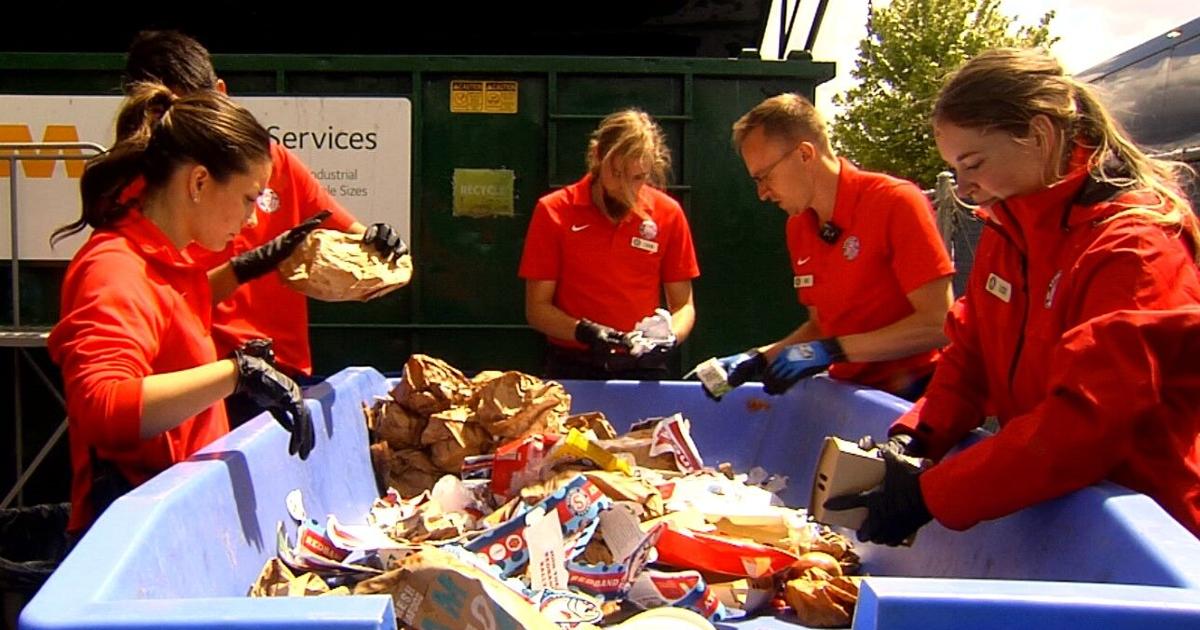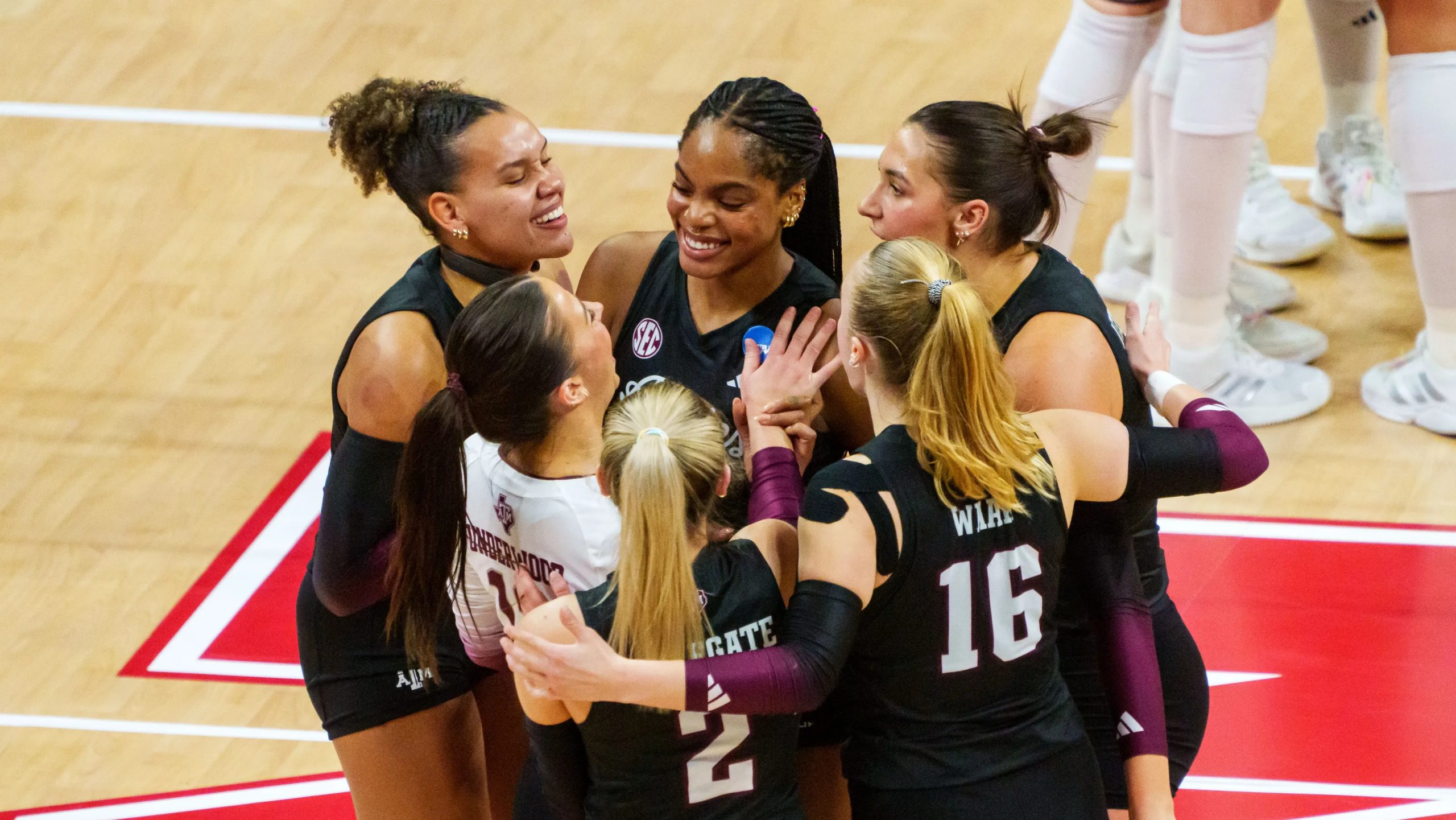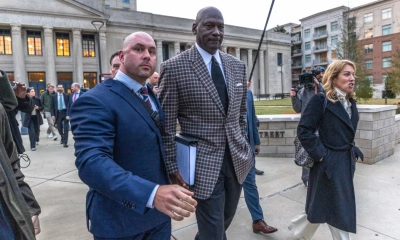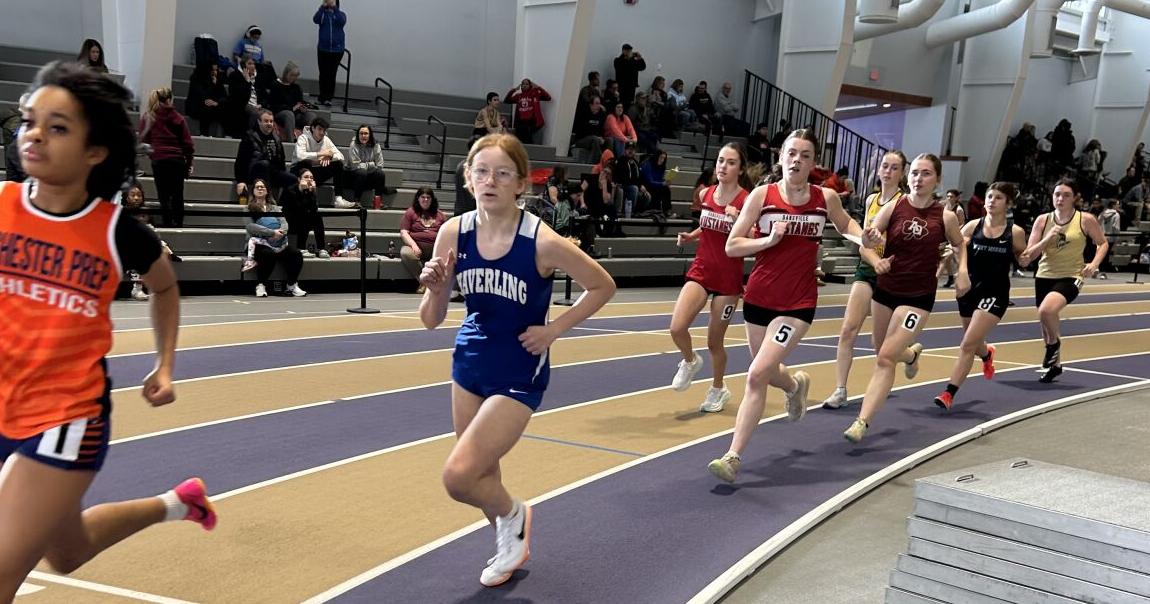Sports
Getting Their Hands Dirty



SPOKANE, Wash. — At Avista Stadium, more than just baseball is happening. Behind the scenes, the Spokane Indians are working hard to reduce their environmental impact, striving to become the first zero-waste facility in Minor League Baseball.
Kyle Day, Spokane Indians vice president and general manager, said the team’s goal is to divert 90% of its waste to compost or recycling. “We don’t have a timeline on that necessarily, but we keep progressing closer towards that each year,” Day said.
The effort, which began in 2019, involves ordering more compostable products and packaging, and sorting compost and recycling by hand after every game. The team’s “green team,” along with front office staff, often roll up their sleeves to help with the process, sorting the trash from recycling by hand after each and every game. That’s right, all 66 of them.
“It really is a large task but we have a lot of fun with it,” Day said. “It kind of morphed from there into what it is today.”
Fans play an important role in making the process smoother. Signage around the stadium educates attendees on what items go into which bins. Day emphasized the importance of following those instructions to ease sorting efforts.
“We make sure there aren’t mustard packets going into recycling, and that lids are off all the Pepsi bottles because those can be projectiles in the sorting facility,” Day said. “We feel it’s the right thing to do as a long-time community member.”
The Indians also use historical data to manage food production and minimize waste. Leftover food is donated to the community through a partnership with Feed Spokane, which distributes it to those in need.
In Minor League Baseball, staff often wear many hats—sometimes literally sorting through compost themselves.
“Especially on busier nights, sometimes we assign specific people, but sometimes we go back, we take a peek at the mound of garbage, and we say, ‘Hey, I think they’re going to need a little extra help tonight, so let’s go pitch in and help them out,’” Day said.
Currently, manpower and time limit the team’s ability to sort all waste perfectly, but the Spokane Indians remain committed to improving their processes and reaching their zero-waste goal.
Sports
H.S. INDOOR TRACK & FIELD: GLOW region athletes shine in RWTL meet at Nazareth University | Sports
Sports
LANE ONE: Projecting the top stories of 2026 (10 to 6), with questions about Russia, Israel, esports, doping, college chaos and, of course, track & field

★ The Sports Examiner: Chronicling the key competitive, economic and political forces shaping elite sport and the Olympic Movement.★
★ To get the daily Sports Examiner Recap by e-mail: sign up here! ★
≡ TOP STORIES of 2026: 10 to 6 ≡
The post-Olympic year of 2025 is done and a Winter Olympic year is getting started in 2026. What will the top stories be in the new year? Time for predictions, or – let’s say – projections of the issues that will garner attention and interest. Some good and some not good at all.
10. Russia, Israel and access to sport
Russia invaded Ukraine on 24 February 2022 and is still fighting its war of aggression. Hamas, the ruling body in Gaza, massacred more than 1,200 Israelis in a coordinated attack on 7 October 2023 and took 250 hostages and Israel responded with a comprehensive attack, leading to a fragile “cease fire,” in effect since 10 October 2025.
In 2022, the International Olympic Committee declared quickly that Russian and Belarusian athletes should not participate in international competitions, including teams. An IOC plan to allow “neutral” individuals who have shown no public support for the war was developed at the end of 2023 and implemented for the Paris 2024 Olympic Games. In December, the IOC decided that Russian and Belarusian “youth” competitors and teams can compete internationally without restrictions, subject to federation rules and procedures.
In October 2025, Indonesia – after giving assurances earlier – refused to allow Israeli athletes to enter the country to compete in the World Artistic Gymnastics Championships. The IOC ended all discussions about future events in Indonesia and the government has still not said it will allow Israeli participation in the future.
At the Olympic Summit on 11 December 2025, the Olympic stakeholders “reaffirmed that athletes have a fundamental right to access sport across the world, and to compete free from political interference or pressure from governmental organisations.”
So what happens in 2026? Russia and Belarus appear to be in a re-entry phase, but what about Israel and other IOC-recognized countries that have been refused visas, such as Kosovo? And what of the increasing scrutiny on entry into the United States, with the 2026 FIFA World Cup in June and July?
9. The IOC and esports?
A 12-year deal between the IOC and the Saudi Arabian National Olympic Committee to create and stage a new, “Olympic Esports Games” was announced with great fanfare in July 2024.
In October 2025, the deal was dead, with the announcement noting in part:
“The IOC, for its part, will develop a new approach to the Olympic Esports Games, taking the feedback from the ‘Pause and Reflect’ process into account, and pursue a new partnership model.
“This approach will be a chance to better fit the Olympic Esports Games to the long-term ambitions of the Olympic Movement and to spread the opportunities presented by the Olympic Esports Games more widely, with the objective of having the inaugural Games as soon as possible.”
What does the IOC do now? Under prior President Thomas Bach (GER), a link to the e-sports community was created, but has stalled. As he noted at the time, the structure of competitive gaming is much different from Olympic sports, with commercial publishers instead of International Federations.
There are perhaps more than three billion active gamers worldwide, but many fewer registered professionals. Will new President Kirsty Coventry’s IOC seek out engagement, as Bach did? Find a blend with active sport contested online, a la the World Rowing Indoor Championships? Do nothing?
Remember this line in “The Godfather” from 1972? Looking to the future, consigliere Tom Hagen told his boss, Vito Corleone, “if we don’t get a piece of that action, we risk everything we have; I mean not now, but ten years from now.”
8. Collegiate sport still in chaos
The U.S. Olympic & Paralympic Committee stated that “75% of U.S. Olympians will have competed collegiately as part of their journey to Team USA” for the Paris 2024 Games and that the American collegiate system is a bedrock of the U.S. athlete development program.
In 2025, collegiate athletics surged into chaos as pay-for-play was fully implemented, firstly and mostly for college football and also significantly impacting college basketball for men and women. The now-legal payments to players, and barely-regulated booster pay on top of that, plus the costs for coaches, support and facilities, threatens to crowd out all other sports, including Olympic mainstays such as track & field, swimming, wrestling, volleyball, gymnastics and many others.
The NCAA is looking to Congress for legislative support and some collegiate conferences and the USOPC are beyond the SCORE Act, which requires that the large football-playing schools maintain a 16-sport program which will ensure continued funding of non-revenue sports, which are essentially everything other than football and basketball at most schools.
But the SCORE Act (H.R. 4312) and competing bills have not made it across the finish line yet and do not appear to be close. The Trump Administration is in favor of a Congressional fix to the college sport mess, but has many other priorities.
There is a wide agreement that collegiate sport’s structure is broken, but how to fix it is not clear. We’re here to help: The Sports Examiner proposed a comprehensive fix in 2024, detailed here.
7. What about the Enhanced Games?
Under the leadership of then-IOC President Juan Antonio Samaranch (ESP), the World Anti-Doping Agency was formed in 1999 to take the global lead against doping in sport, on competitive, ethical and medical safety grounds.
In 2025, a new competition was announced, doing away with doping tests and encouraging “enhanced” athletes to compete in a showcase of “superhumans,” titled the Enhanced Games, planned to be held at Resorts World in Las Vegas, Nevada in late May of 2026.
Widely condemned, the event is to feature a small number of sprint events in track & field and swimming, plus weightlifting, all trying to break world records set by athletes who have competed in competitions which follow the World Anti-Doping Code.
Each event is to have a $500,000 prize purse, with $250,000 for the winner; world-record bonuses will pay $250,000 except for the 50 m Free swim and 100 m dash, which will have $1 million payouts for records.
WADA and many other organizations have labeled the event dangerous and unethical. The promoters have had trouble signing up athletes, who will be instantly banned from Olympic and International Federation competitions. So far, nine swimmers, three track athletes and two weightlifters have agreed to participate, and the Enhanced Games had a lawsuit alleging restraint of trade against WADA, World Aquatics and USA Swimming was dismissed.
But the Enhanced Games got a $40 million lifeline in a complex transaction in November, with the promise of more, with a product line to follow which would be the basis of the business going forward.
Will the Enhanced Games be held? If so, will anyone care? Many in the Olympic world have disowned it, but there will be attention paid to see what happens – if anything – in May.
6. Will ATHLOS succeed where Grand Slam Track failed?
One of the big questions of 2025 was whether Michael Johnson’s Grand Slam Track would succeed. It did not, staging only three of its planned four meets, selling less than 65,000 tickets across eight meet days and staring at $31.4 million in debt at the end of 2025.
Now in Chapter 11 bankruptcy proceedings in Delaware, Grand Slam Track is trying to settle its debts – it owes its athletes about $7 million – and get re-energized with new funding. It will have an uphill climb to regain any trust within the track & field community. But it is trying.
Getting ready to enter the fray, apparently, is ATHLOS, a project of Reddit co-founder Alexis Ohanian, who staged two showy, end-of-season meets in New York in 2024 and 2025, with a limited event program, strong athlete pay and integrated concerts which had more fan attention than the meets.
Ohanian has promised an ATHLOS “league” beginning in 2026:
“The ATHLOS League introduces a team-based competition model designed for and by the modern athlete. Taking place after the conclusion of the World Athletics season, ATHLOS will feature multiple meets hosted in major cities, culminating in a final championship event.”
The ownership is to include athletes such as Sha’Carri Richardson, Gabby Thomas and Tara Davis-Woodhall. That’s all there is to say at present. The details, with Grand Slam Track’s experience as a cautionary tale, will be fascinating.
Coming New Year’s Day: our projected top-five stories of 2026, including a fight over science and two of the world mega-events.
Rich Perelman
Editor
★ Receive our exclusive, weekday TSX Recap by e-mail by clicking here.
★ Sign up a friend to receive the TSX Recap by clicking here.
★ Please consider a donation here to keep this site going.
For our updated, 850-event International Sports Calendar for 2025, 2026 and beyond, by date and by sport, click here!
Sports
Texas A&M Volleyball makes USA Today’s Top Women’s Moments list

Dec. 31, 2025, 8:16 p.m. CT
When it comes to recent college athletics, few stories can match the rise of the Texas A&M volleyball program—a team that went from unranked three years ago to national champions. Their remarkable climb just earned major national recognition, as one of the country’s biggest publications placed their title run among the top women’s sports moments of the year.
On Monday, USA Today released its 2025 Top Ten Women’s Sports Moments, highlighting the most unforgettable achievements across the country. Women’s athletics delivered countless headline‑worthy performances this year, but when it came to upsets, nothing topped Texas A&M’s five‑set stunner over No. 1 Nebraska in the NCAA Tournament.
The Aggies toppled the undefeated favorite on its home floor, in front of a sea of red, to punch their ticket to the Final Four—then dominated the rest of the field on their way to the program’s first‑ever national championship.
Under head coach Jamie Morrison, A&M’s fast‑paced, aggressive style overwhelmed opponents all season. Just as important, Morrison instilled a belief in his team that they belonged on the sport’s biggest stage—and that they were capable of winning it all. The Aggies played like it, too.
Their takedown of the sport’s juggernaut didn’t just shift the tournament. It put the entire volleyball world on notice. And now, that moment has been cemented nationally, earning the No. 10 spot on USA Today’s list of the top women’s sports moments of the year.
Contact/Follow us @AggiesWire on X and like our page on Facebook to follow ongoing coverage of Texas A&M news, notes, and opinions. Follow Jarrett Johnson on X: @whosnextsports1.
Sports
2025 Volleyball Year in Review – UCF Athletics

A PERIOD OF FIRSTS AND MILESTONES
Botsford had to wait just over 100 minutes to secure his first win as head coach at UCF, as the Knights disposed of Chattanooga in four sets in the 2025 season opener. The contest commenced the Black and Gold Classic and an 11-match non-conference slate. It was also the first glance at the swarm of depth present at The Venue, with five Knights registering five or more kills.
Sweeps over Norfolk State and UC Riverside preceded the first road trip of the slate at the 305 Challenge in Miami. UCF demolished Statson in the first contest, outscoring the Hatters by 40 points across just 66 minutes of action. A Saturday night tilt with eventual NCAA second-round participants, Miami, saw the Knights beaten by a combined six points, a learning opportunity for the squad and a glimpse of the level of competition expected in the Big 12.
The weekend capper against hosts FIU featured 13 aces from UCF and the first breakout from English, who boasted eight and the most by a Knight since 2021. From then, the FGCU transfer never left the NCAA national rankings while widening her gap as the active leader in division one.
Returning home for three matchups before opening Big 12 action with Baylor, the Black and Gold produced their most complete performance of the season to open the Knights Invite, sweeping a red-hot Arkansas State team behind a formidable defensive display. The ‘Nauts then took care of business against Florida Atlantic in their first space match of the year in four sets. However, the highs of the past 48 hours were erased after a difficult defeat to Brown, a disappointing result with conference play just two days away.
The Big 12’s most historic program, Baylor, handed the Knights a three-set loss, with a contested third-set still supplying indications of future ranked contests. Before the rest of league play resumed, UCF ventured to the Crimson Classic in Tuscaloosa, Alabama, striving to bounce back into the win column.
English was at the forefront of a well-rounded display against Memphis, tallying a career-high nine aces, tied for the second most by an athlete in a four-set NCAA match this season, to set the tone. A day later, the Knights disposed of the hosts in another four-set clinic, with first-year’s Haley and Porter playing substantial time in the contest. With Botsford’s first non-conference slate with the Knights completed, a 9-2 clip underlined the first sign of growth compared to a 7-3 record a year prior.
Sports
The 2025 Your Prep Sports Area Volleyball Team

Ryan Murken
Your Prep Sports
The 2025 volleyball season was another memorable season in the Your Prep Sports area.
West High, Clear Creek Amana and Regina all qualified for the state tournament with Clear Creek Amana advancing to the Class 4A semifinals.
Liberty High won 24 matches and advanced to a 5A regional title game and Solon won 29 matches and advanced to a Class 3A regional final.
The annual Your Prep Sports area volleyball team is a way to honor some of the players responsible for that team success this fall.
The 2025 Your Prep Sports all-area team features all-state and all-conference players, conference players of the year, state tournament participants, school record holders and college recruits.
This year’s 16-member team features players from all seven area schools including four nine players from state qualifiers Clear Creek Amana, West High and Regina.
Regina senior Reese Naeve is the captain of the 2025 Your Prep Sports all-area team after leading the state in kills for the second consecutive season.
An Iowa State signee, Naeve had 730 kills and 505 digs while leading Regina to the first back-to-back state tournament appearances in program history.
Naeve is the Your Prep Sports all-area team captain for the second consecutive season and is a four-time member of the team.
She is one of eight repeat selections on this year’s team joining three-time all-area team members Hadley and Edie Miller from Liberty High and Clear Creek Amana senior Averie Lower.
West High junior Sophia Austen, Clear Creek Amana senior Emily Henderson, Regina junior Addison Bollier and City High junior Hattie Galloway are all making their second appearance on the Your Prep Sports all-area team.
Reese Naeve (Captain)
Senior, Regina
The most productive hitter in the state the past two seasons Naeve capped a brilliant prep career by leading Regina to the first back-to-back state tournament appearances in program history.
Naeve hammered a state-best 730 kills on a career-best hitting percentage of .334 while leading Regina to a 30-14 record and a spot in the Class 2A state tournament.
An Iowa State signee, Naeve led the state in kills for the second consecutive season and her 730 kills were 192 more kills than any other player in the state.
Naeve was named to the Elite all-state team and was the River Valley Conference South Division player of the year after helping Regina to its highest win total in at least 17 seasons.
The 5-foot-9 Naeve did more than just hit during her impressive season.
She had 40 blocks and 36 ace serves and ranked 16th in the state and sixth in Class 2A with 505 digs.
A four-year starter Naeve had at least 440 kills in each of the last four seasons closing her career with a program-record 2,525 kills.
Naeve also had 1,498 digs career digs, 146 career ace serves and 100 career blocks while helping Regina to 99 wins over the past four seasons.
Averie Lower
Senior, Clear Creek Amana
Among the top players in the state over the past several seasons Lower concluded a brilliant career by helping Clear Creek Amana to a fourth consecutive state tournament appearance.
Lower led the Clippers in kills for the second consecutive season, posting a fourth straight season with at least 220 kills as Clear Creek Amana went 42-4 and advanced to the Class 4A semifinals.
The 6-foot Lower had a team-high 344 kills on .285 hitting on her way to being named the WAMAC West Division player of the year and a first-team Class 4A all-state selection.
An Arizona State basketball recruit, Lower ranked seventh in Class 4A with 344 kills and added 296 digs, 50 blocks and 28 ace serves.
A four-year starter, Lower finished her career with 1,258 kills and 1,279 digs after posting back-to-back seasons with at least 340 kills and 290 digs.
Sophia Austen
Junior, West High
West High enjoyed a breakthrough season this fall posting its highest win total in a decade and making its first state tournament appearance since 2016 and Austen was a big part of the success for the Trojans.
Austen earned Class 5A first-team all-state honors and was a unanimous Mississippi Valley Conference first-team all-Mississippi Division selection following a stellar season in which she ranked 12th in 5A with 285 kills.
An Iowa State recruit, Austen ranked second on the team with 285 kills on .217 hitting and added 318 digs, 36 blocks and 34 ace serves while helping West High to a 27-6 record.
A three-year starter, Austen has already amassed 760 career kills and 763 career digs.
Emily Henderson
Senior, Clear Creek Amana
One of the best and most productive setters in the state Henderson put the finishing touches on a stellar prep career with her best season.
Henderson ranked second in Class 4A and fourth in the state with a career-high 1,012 assists leading Clear Creek Amana to a 42-4 record and a fourth consecutive state tournament appearance.
A four-year starter, Henderson led Clear Creek Amana to a 159-24 record, three state semifinal appearances and a state title game trip in her time leading the Clipper attack.
Henderson was at her best this season adding 92 kills on .433 hitting, 249 digs and 26 blocks on her way to being a unanimous first-team all-WAMAC West Division pick and first-team Class 4A all-state selection.
In her four-year career Henderson racked up 2,988 assists, 992 digs and 301 kills.
Edie Miller
Junior, Liberty High
One of the top backrow players in the state Miller continued her impressive prep career with another stellar season.
Miller earned Class 5A second-team all-state honors after ranking second in 5A with 5.2 digs per set to help Liberty High to a 24-11 record and a spot in a 5A regional title game.
A Dayton recruit, Miller was a unanimous Mississippi Valley Conference first-team all-Mississippi Division pick after ranking third in 5A with 480 total digs.
Miller added a career-high 34 ace serves this season as Liberty High advanced to a regional title for the seventh consecutive season.
In three seasons Miller has amassed 1,622 career digs and 88 ace serves.
Hattie Galloway
Junior, City High
Galloway continued her steady ascent into one of the state’s top players this season posting career-highs in kills, digs and blocks on her way to earning all-state honors.
A three-year starter, Galloway has increased her production each of the past two seasons compiling her best season to date this fall.
Galloway earned Class 5A second team all-state honors after a junior season in which she was one of only two players in 5A with 270 kills, a hitting percentage over .300 and 70 blocks.
The 6-foot-1 Galloway led City High with 270 kills, a .321 hitting efficiency and 73 blocks on her way to being a unanimous Mississippi Valley Conference first-team all-Valley Division selection.
Galloway also had a career-high 107 digs and 19 ace serves this season helping City High to a 9-19 record.
Kiley Devery
Senior, Solon
Devery capped an excellent career with a breakthrough senior season in which she established herself as one of the top hitters in Class 4A.
The 6-foot-2 Devery posted career-highs in both kills and digs while leading Solon to a 29-10 record and a spot in a Class 4A regional title game.
Devery earned Class 4A third-team all-state honors and was a unanimous first team all-WAMAC East Division selection after leading Solon with 338 kills on .272 hitting.
A Fresno State recruit, Devery added 56 blocks, 104 digs and 27 ace serves while helping Solon to its highest win total in 10 years.
A four-year starter, Devery finished her high school career with 1,027 kills including 524 over the past two seasons.
Addison Bollier
Junior, Regina
Bollier continued to build her resume as one of the top backrow players in the state with an impressive junior season in which she led the state in digs while helping Regina return to the Class 2A state tournament.
A Samford recruit, Bollier collected a state-beset 794 digs this season, averaging 6.8 digs per set while helping the Regals to a 30-14 record and a second consecutive appearance at the Class 2A state tournament.
Bollier has quickly emerged as one of the state’s best backrow players increasing her dig total in each of the past two seasons.
After collecting 380 digs as a freshman Bollier has led the Regals in digs each of the past two season while collecting 1,477 digs during that span.
Bollier was a third-team Class 2A all-state pick and earned River Valley Conference South Division first team honors last season when she added 25 ace serves.
In her career Bollier has 1,857 digs.
Bailey Simpson
Junior, Clear Creek Amana
The emergence of Simpson has a dominant force on both sides of the net was a huge reason for the success of Clear Creek Amana this season as the Clippers won 42 matches and advanced to the 4A state semifinals.
Last season as a sophomore Simpson established herself as a solid option for the Clippers posting 216 kills on .242 hitting.
This season Simpson took her game to another level earning Class 4A second-team all-state and unanimous first-team WAMAC West Division honors after ranking second on the team in kills and leading the Clippers in blocks.
Simpson hammered a career-high 298 kills and ranked third in Class 4A with a hitting efficiency of .379.
The 6-foot-2 Simpson was equally efficient defensively as she led Clear Creek Amana and ranked fourth in Class 4A with 101 blocks to go with 88 digs.
Lila Eastvold
Junior, West High
Eastvold took a huge step forward in her second season leading the West High attack helping the Trojans to their best season in nearly a decade.
The 5-foot-10 Eastvold ranked third in Class 5A with 895 assists to help West High to a 27-6 record and its first state tournament appearance since 2016.
Eastvold earned Class 5A third-team all-state honors and was a unanimous Mississippi Valley Conference first-team all-Mississippi Division selection following her breakthrough junior season.
In her second season as the full-time starter at setter, Eastvold had career-highs in kills, hitting efficiency, digs and blocks along with her 895 assists.
Eastvold had 62 kills on .306 hitting and added 178 digs, 22 blocks and 32 ace serves.
Cyan Blommer
Freshman, West High
Blommer burst onto the scene this season wasting no time establishing herself as one of the top young hitters in the state.
In her varsity debut season Blommer led West High and ranked 11th in Class 5A with 287 kills while helping the Trojans to a 27-6 record and their first state tournament appearance since 2016.
The 287 kills for Blommer were the most for a freshman in Class 5A and the sixth most for any freshman in the state this season.
A first-team Mississippi Valley Conference all-Mississippi Division selection, Blommer hit .217 in her debut season and did a lot more than just hit.
Blommer ranked second on the team with 320 digs and added 14 ace serves and 17 blocks as West High posted its highest win total since 2015.
Amelia Guinn
Freshman, Solon
Among the top freshman in the state Guinn posted a stellar debut season ranking second on the team in kills while helping Solon reach a Class 4A regional title game.
In her first varsity season Guinn acclimated quickly hammering 237 kills on .220 hitting on her way to earning second-team all-WAMAC East Division honors.
The 6-foot-1 Guinn added 30 blocks and 67 digs during an impressive debut season that concluded with a 20-kill effort in a regional final loss to Marion.
Guinn ranked 15th in the state among freshman for total kills and her 237 kills were the fifth most for freshmen in Class 4A and 5A this season.
Hadley Miller
Junior, Liberty High
Among the most versatile players in the state Miller continued to do it all for the Lightning while helping Liberty High to a 24-11 record and a spot in a 5A regional title game.
Miller was a Mississippi Valley Conference second-team all-Mississippi Division pick after ranking fifth in Class 5A with 758 assists.
A three-year starter, Miller had her best season to date this fall posting career highs in assists, kills, hitting percentage, digs, blocks and ace serves.
In addition to leading the Lightning in assists, Miller ranked fourth on the team with 133 kills on .262 hitting which ranked second on the team.
The 5-foot-5 Miller ranked second on the team with 306 digs and had 25 blocks and 37 ace serves.
Briley Kaalberg
Senior, West Branch
Kaalberg followed up a strong junior season with an exceptional senior season in which she led the Bears in kills, hitting efficiency and blocks.
The 6-foot Kaalberg earned all-River Valley Conference South Division second-team honors after hammering 228 kills on .337 hitting.
Kaalberg was efficient on offense but was perhaps even better defensively as she ranked fifth in Class 2A with 115 blocks and was third in 2A with 1.2 blocks per set.
The senior standout also had 45 digs and 22 ace serves while helping West Branch to an 18-18 record.
Over the past two seasons Kaalberg had 361 kills and 181 blocks.
Julia Schlarbaum
Sophomore, Clear Creek Amana
After posting 94 kills in a complimentary role last season as a freshman Schlarbaum emerged as one of the top young hitters in the state this season with a breakthrough sophomore season.
Schlarbaum ranked third on the team in both kills and hitting efficiency while helping Clear Creek Amana to a 42-4 record and a spot in the Class 4A state semifinals.
The 6-foot Schlarbaum had 264 kills on .288 hitting on her way to earning second-team all-WAMAC West Division and third-team Class 3A all-state honors.
Schlarbaum led Class 4A with 72 ace serves and added 26 blocks while helping Clear Creek Amana to a fourth consecutive state tournament appearance.
Kennedey Whitford
Senior, Solon
A backrow stalwart for the Spartans the past four seasons Whitford capped a stellar prep career with her best season this fall.
Whitford led Solon in digs for the fourth consecutive season on her way to earning Class 4A third-team all-state honors and unanimous WAMAC East Division first-team honors.
A South Dakota State recruit, Whitford had a career-high 446 digs and led the Spartans with 51 ace serves while helping Solon to a 29-10 record and a spot in a Class 4A regional title game.
Whitford ranked fourth in Class 4A in total digs and seventh in 4A with 4.4 digs per set and also added 116 assists in a strong senior season.
A four-year starter, Whitford closed her career with three consecutive seasons with at least 400 digs finishing with 1,545 digs and 119 ace serves.
Did you enjoy this subscription free article? Help keep Your Prep Sports free by donating
Sports
Fantin’s Late Goal Lifts No. 4 Nittany Lions over No. 10 Cornell – Penn State
-

 Sports3 weeks ago
Sports3 weeks ago#11 Volleyball Practices, Then Meets Media Prior to #2 Kentucky Match
-

 Motorsports3 weeks ago
Motorsports3 weeks agoNascar legal saga ends as 23XI, Front Row secure settlement
-

 Motorsports3 weeks ago
Motorsports3 weeks agoSunoco to sponsor No. 8 Ganassi Honda IndyCar in multi-year deal
-

 Sports3 weeks ago
Sports3 weeks agoMaine wraps up Fall Semester with a win in Black Bear Invitational
-

 Motorsports2 weeks ago
Motorsports2 weeks agoRoss Brawn to receive Autosport Gold Medal Award at 2026 Autosport Awards, Honouring a Lifetime Shaping Modern F1
-

 Rec Sports3 weeks ago
Rec Sports3 weeks agoWNBA’s Caitlin Clark, Angel Reese and Paige Bueckers in NC, making debut for national team at USA camp at Duke
-

 Motorsports3 weeks ago
Motorsports3 weeks agoRick Hendrick comments after the NASCAR lawsuit settlement
-

 NIL3 weeks ago
NIL3 weeks agoNike Signs 10 LSU Athletes to NIL deals
-

 Rec Sports2 weeks ago
Rec Sports2 weeks agoStempien to seek opening for Branch County Circuit Court Judge | WTVB | 1590 AM · 95.5 FM
-

 Rec Sports3 weeks ago
Rec Sports3 weeks agoEast Bay woman who embezzled $1.6 million from youth charity sentenced to prison




































